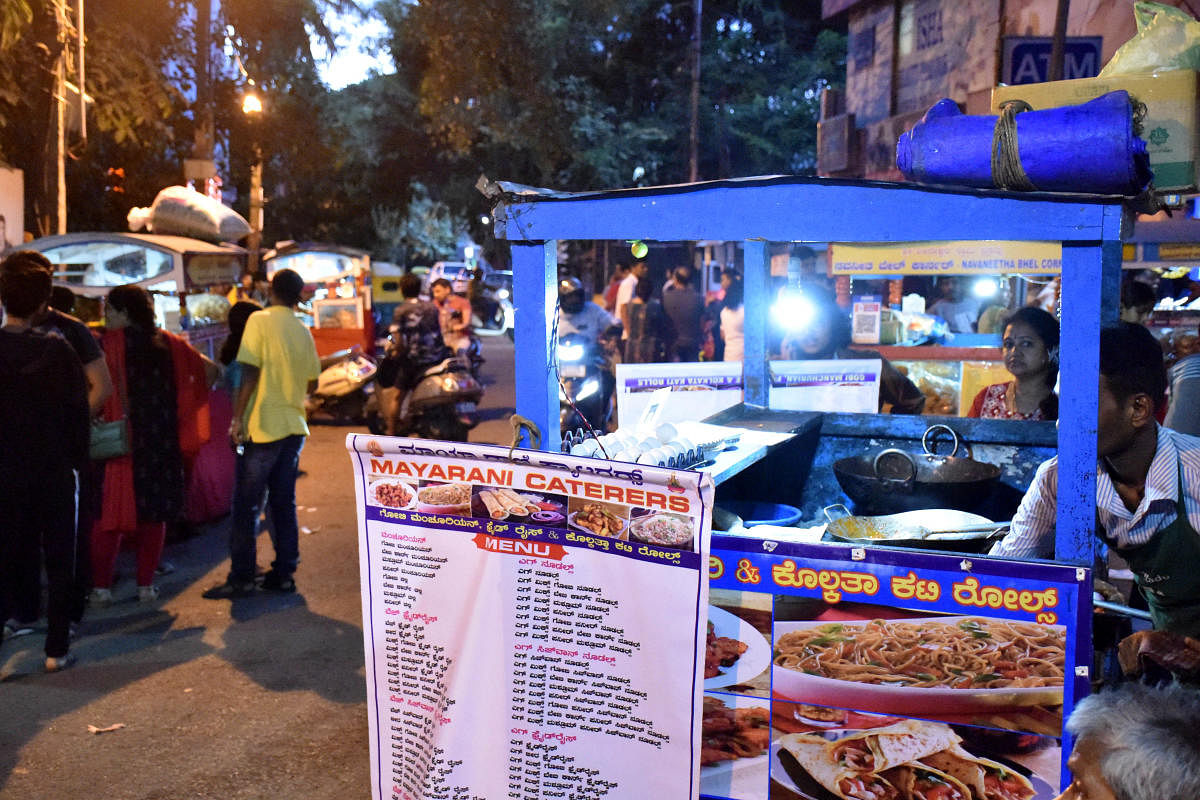
The Bruhat Bengaluru Hotel Association has approached the BBMP to regulate street food businesses in Bengaluru.
In a letter to the Bruhat Bengaluru Mahanagara Palike (BBMP) commissioner, the association has complained about unhygienic and unsafe practices. The association has close to 2,000 restaurant and hotel owners as members.
“Street food stalls are growing at an abnormal pace. What is alarming is the lack of hygiene. These stalls might provide you food at lower prices, but they are compromising on factors like cleanliness,” says P C Rao, president of the association.
He says street food vendors pose a safety hazard on footpaths. “They have gas cylinders and stoves where there is constant movement of pedestrians and traffic. Also, traffic is blocked at several places because of them,” he tells Metrolife.
Vendors can be employed at Indira Canteens so that they continue to earn a living, he suggests. “Some 40 Indira Canteens are shut currently. If they are opened, street vendors can work there as cooks and serving staff. Instead of making food on streets, they can be employed at more hygienic establishments,” he says.
The BBMP commissioner, he says, has responded to the plea, and is conducting a survey. The association plans to meet with the police commissioner and BBMP to discuss the same issue in the coming weeks.
Training in progress
Six months ago, the BBMP launched a mandatory training programme for street food vendors, an official says.
Vendors are trained to comply with Food Safety and Standard Authority of India guidelines. After completion of training, they get certificates, which they must display on their carts.
So far, across six zones in the city, about 6,000 street food vendors have completed training and received certificates, a senior BBMP official told Metrolife.
“The attempt to organise and create better facilities for roadside food vendors is in progress. The vendors are showing interest,” he said.
According to S Babu, president of the Bengaluru District Street Vendors Association, about 20% of 700 street food vendors have already received training.
“We are getting all the necessary certificates. What more are we supposed to do?” he says.
He says the call for a ban on street vendors is unfair and badly timed. “We had no means of earning a livelihood during the pandemic. Now, when things are finally improving, why are they creating unnecessary problems?” he says.
He hopes the BBMP and the government stand by the street vendors, and help build a safer working environment for them. “Unlike big hotels, we have nothing to hide. The food is prepared right in front of you and our rates are low. Many depend on us as not everyone can afford to eat at big restaurants every day,” he adds.
Vendors welcome certification
Shivamma, who sells fruit chaat on Church Street, has no clue about the ongoing BBMP training, but welcomes the idea.
“If we have an official certificate, we will no longer be harassed by the police and other officials. Maybe we will be treated like legitimate businesses,” she says.
Rajan Kumar, a street food vendor in Rajajinagar, was surprised to hear of the BBMP’s training programme.
“No one has approached me, and even my friends who are street vendors aren’t aware of this. But, if it is really happening, I hope it will allow us to function at night. While big restaurants get permission to stay open till 1 am, we are shooed away by the police by 10 pm. This is unfair,” says Rajan.
‘Shutting down street vendors is a violation of their rights’
According to the Street Vendors (Protection of Livelihood and Regulation of Street Vending) Act, 2014, the city authorities are required to conduct a survey, identify street vendors and provide them with official certificates every five years.
“The very purpose of issuing this certificate is to ensure that they are not unnecessarily relocated or evicted. They have to conduct business in the area allocated to them. The Act says they can’t be removed in the absence of a survey. This would be a violation of their rights,” says K M Sai Apabharana, advocate.